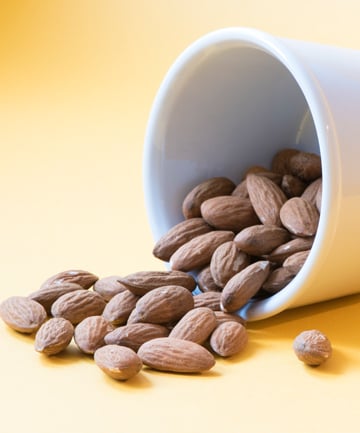There are countless health benefits that come from eating a diet rich in healthy fats, such as the kind found in your favorite seafood sources. "Specifically, tuna, salmon, mackerel and other fatty fish provide omega-3 fats, an essential fatty acid," explains Amidor. "Omega-3 helps regular brain chemicals, including dopamine, which the brain releases in response to positive, happy experiences and serotonin." Another reason to add omega-3s to your diet is that they reduce inflammation, which leads to an imbalance of flora in the intestines. "Symptoms, although not always apparent, can include bloating, diarrhea or painful digestion — the culmination of which is a real recipe for a bad mood," says Kimszal.
Image via Getty
Image via Getty
These two classic comfort foods might make us feel good in the moment but shortly after, we're bound for a crash. "Eating a diet high in white pasta and bread will cause a surge in blood sugar causing your pancreas to respond by producing insulin to help clear the sugar from your blood," says Jeanette Kimszal, RDN. "These carbohydrates make your body work harder to digest, leaving you feeling lethargic, prone to mood swings and less alert." Gotta have your carbs? Fill up on the complex kind — true whole grains and vegetables like quinoa or spaghetti squash, which contain fiber to slow digestion and keep your metabolism in check.
Image via Getty
Image via Getty
This all-important nutrient is responsible for many bodily functions, including regulating nerve function, maintaining blood sugar levels, making protein and ensuring that blood levels are stable. "Low levels of magnesium are associated with increased inflammation and oxidative stress, both of which are associated with depression," explains Alissa Rumsey MS, RD, founder of Alissa Rumsey Nutrition and Wellness and creator of the 5-Minute Mindful Eating Exercise. Eating enough magnesium from sources like quinoa, spinach, beans, pumpkin seeds, brazil nuts, almonds, cashews and flaxseed may help lower symptoms of anxiety and depression, she adds.
Image via Getty
Image via Getty
Whether you're sipping diet soda to help slash calories or you simply like the flavor, you probably already know it's not the greatest for you. But did you also know that zero-calorie sugar substitute aspartame may be linked to headaches, dizziness, digestive problems, mood changes, Alzheimer disease, multiple sclerosis and some cancers? "Sugar in moderation is a healthy alternative to aspartame," says Ross.
Image via Getty
Image via Getty
You're probably already familiar with the myriad reasons you should be incorporating more greens into your diet but you might not have realized the influence one of the main nutrients found in these greens can have on your mood — specifically, B-vitamin folate. "Increasing foods high in folate, like kale, spinach and collard greens, may help stabilize mood by reducing depression," says Amidor. One study published in PrevMED analyzed hundreds of thousands of adults and found that consumption of fruits and veggies rich in folate and antioxidants significantly reduced the risk of depression, anxiety and other psychological disorders.
Image via Getty
Image via Getty









